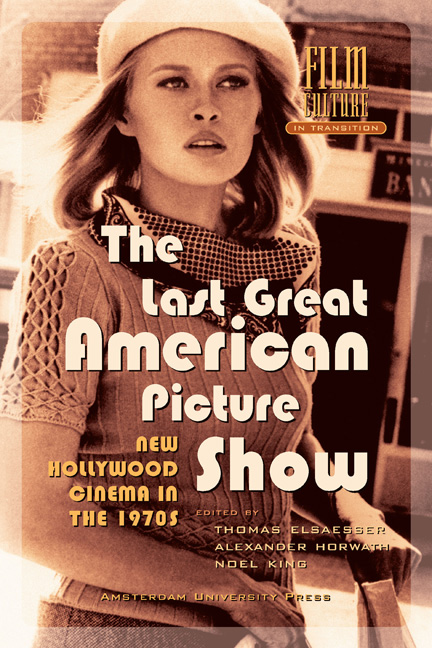The Impure Cinema: New Hollywood 1967-1976
Published online by Cambridge University Press: 25 January 2021
Summary
So you have stumbled indeed, without the aid of LSD or other indole alkaloids, onto a secret richness and concealed density of dream; onto a network by which X number of Americans are truly communicating whilst reserving their lies, recitations of routine, arid betrayals of spiritual poverty, for the official government delivery system; maybe even onto a real alternative to the exitlessness, to the absence of surprise to life, that harrows the head of everybody American you know, and you too, sweetie.
The title of this book suggests a certain cultural pessimism. It talks about a Golden Age and a closed chapter of history: The Last Great American Picture Show. Generally, demarcations of this sort are hard to justify and are more of a hindrance to an open engagement with films. They tend to originate in the romantic notion that cultural history unfolds in discrete episodes (”narratives”), and they often reflect the formative influences of the author. If you have come of age as a cinema-goer during the heyday of New Hollywood cinema – sometime between BONNIE AND CLYDE AND TAXI DRIVER – you’ve probably experienced the main brands of post-1970s American cinema by necessity as less rich, less intelligent, less political, as retrograde.
My own first experiences of the cinema stand in contrast to this account – even if, in the end, they led to similar conclusions. I started to go the movies regularly at the end of the Seventies. Star Wars, which I saw six or seven times during 1977/78, propelled this habit. It's a film that fairly exactly marks the point at which public discourse and popular cinema in the United States underwent a crucial shift in emphasis. Towards the end of the Seventies, the increasingly complex narrative negotiation of (both fictional and very real) contradictions and conflicts started to recede behind the phantasms of a neoconservative discourse of re-mythologisation, re-evangelisation and re-militarisation, gradually disappearing from view altogether in the course of the Reaganite era. So in a sense my first cinema was already “post-classical” and post-modern – a cinema of hyper-genres, often accompanied by an ironic affirmation of shop-worn myths and relying more on textures, surfaces, auralvisual effects and on “somatic” audience responses.
- Type
- Chapter
- Information
- The Last Great American Picture ShowNew Hollywood Cinema in the 1970s, pp. 9 - 18Publisher: Amsterdam University PressPrint publication year: 2004

